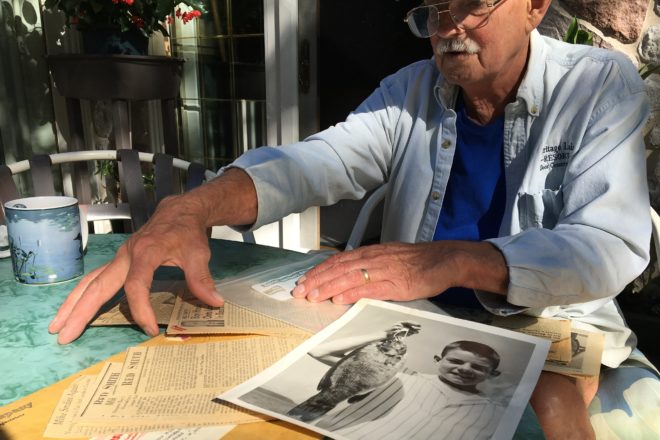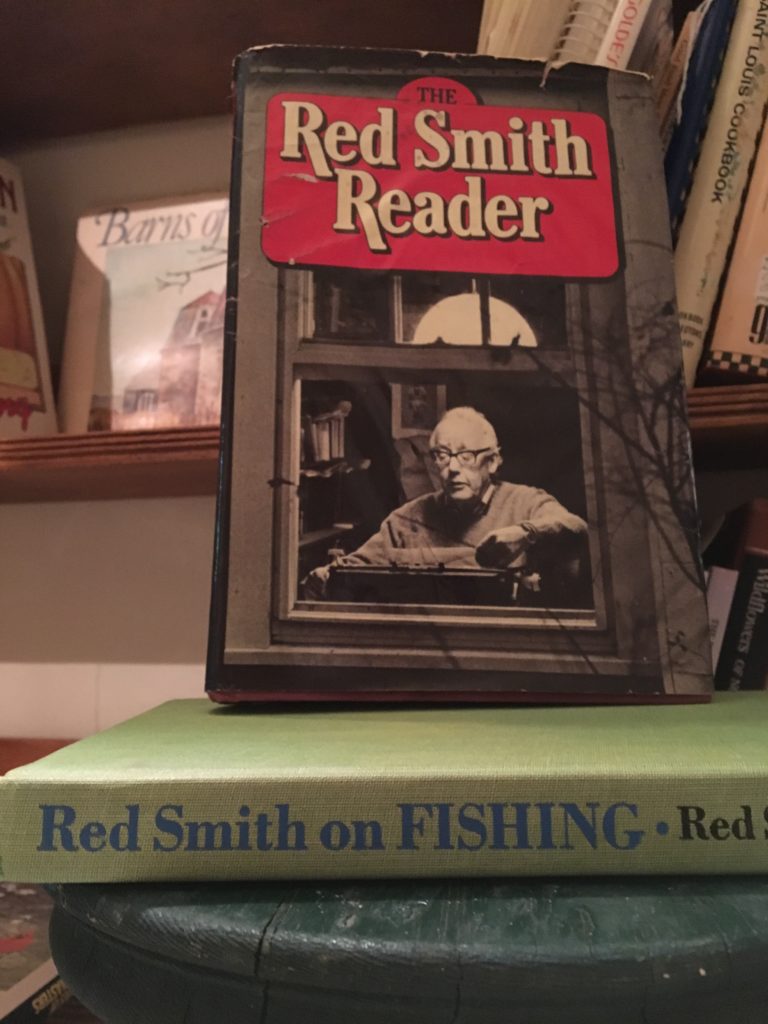How Red Smith Lured Readers to Door County
- Share
- Tweet
- Pin
- Share

By Craig Sterrett
A Pulitzer Prize-winning newspaperman revered for poetically telling extraordinary stories about ordinary events made Sturgeon Bay resident Mike Dietman world famous 58 summers ago. Back then, he was a fisherman.
As bait, Dietman used one of the hellgrammites he netted from then-pristine Little Lake in Sunset Park and sold to tourists or guests at his parents’ Wan-Na-Walk cottages. He caught a 4-pound, 4-ounce smallmouth bass near the old quarry on the northwest shore of Sturgeon Bay. The fish took first place in a Mac’s Sports Shop contest and won him a rod and reel that he still has, but he had to wait several weeks to see if his lunker would hold up.
The smallmouth was big for that time, unlike these days when six-pounders occasionally come out of the bay. But the fish’s story also found a place in a richly composed column by American sportswriter Red Smith. Like that prize rod and reel, Dietman treasures those August 1959 newspaper clippings of the story found in papers worldwide, including the Chicago Sun-Times and the New York Herald.
In between covering the Olympics, NFL, offbeat sports or trying to make World Series stories less boring than he found the game, Smith frequently wrote about fishing.
Red Smith on Fishing, a 1963 collection of stories, features 10 articles about his Door County friends and fishing experiences.
“There’s good reason for that,” said Terence Smith, Red Smith’s son, a journalist who covered the Six-Day War in Israel a half-century ago and is a frequent contributor for PBS, CBS and his adopted hometown, Annapolis, Maryland.
Door County had already earned a reputation as an air-conditioned playground and for its orchards, but Red Smith helped make it an iconic destination for fishermen dreaming of reeling in the plentiful, hard-fighting smallmouth black bass.
Why did the Smiths vacation in Door County if, as Red’s daughter Kit recalled, it meant miserable trips from New York on two-lane highways or by Great Lakes ferries?
Red’s parents, Walter and Ida, were Green Bay natives who relocated to Sturgeon Bay. One of the family elders administered a housing program for shipbuilders in Sturgeon Bay. Another relative married an owner of what is now the Cupola House in Egg Harbor, which Kit recalled as the site of many a dull dinner with old people on afternoons when she’d rather be on a beach.

Used bookstore finds revealed stories about fishing in Door County by Red Smith, in Red Smith on Fishing, 1963; and The Red Smith Reader, 1982. Smith and his family spent his July vacation in Door County in the 1940s, ‘50s and ‘60s until the sportswriter’s father, Walter, moved from Sturgeon Bay to Florida. While in Door County, Red wrote, they took a toll on the piscine population. Photos by Craig Sterrett.
In Door County, most of Red’s articles dealt with his pursuit of smallmouth black bass, as they were called at the time. (He pointed out that “the aristocrat of the marine colony … is not black and has a mouth suitable for storing oranges.” In the same article, he noted Kangaroo Lake smallmouths are more “blonde with a vague greenish cast” and that “in this wonderful smallmouth country, there are no uglier, angrier, meaner fish than these pallid brutes, none more eminently fitted by temperament for burning down orphan asylums.”)
Red was passionate about fishing and preferred to fish with a fly rod. Usually, he wrote more about his outings with old friends and other fishing enthusiasts, but sometimes wrote about outings with family. Terence recalled a time when they’d hopped from fishing spot to fishing spot, with stop-offs at a bar or two in between. The father quoted the son in a column.
“I said, ‘Dad isn’t this great, going out fishing and eating in saloons?’” Terence recounted. “He liked that.”
Terence said they’d visit with family in midday sometimes in Sturgeon Bay and later Ephraim, where Red had an aunt. While Red wrote about fishing all over the peninsula and the world, the family fished a great deal of the time along the northwest shore of Sturgeon Bay. They’d catch perch, walleye and pike — just about anything, except sturgeons, in Sturgeon Bay.
The story, description and subtleties filled his stories, which often ended with a punch, such as how a buxom woman in Green Bay stitched up a “pair of lady’s dimity drawers of the chaste bloomer-girl type, weighted and tied shut at the knees” to participate in a smelt-netting outing.
In a story on fishing with a buddy in Europe Lake, he related a mystery of sorts: in short, they were getting a few bites over a stony-bottomed, reedy spot near the launch ramp when a game warden checked their license and told them how conservation workers had found a lot of fish while sampling a deep spot in the middle. He towed Red and his pal to that spot, and they caught nothing. Before sunset, they paddled back to the first spot and “eight bass had been encountered.”
“You don’t suppose, Lawrence, that that devious dastard deliberately hauled us away from the best fishing?”
“Preposterous,” Larry said. “He’s an officer of the law.”
Fishing columns fill chapters of The Red Smith Reader, which was published in 1982, the year Red Smith died, and they enrich a newly released collection, American Pastimes: The Very Best of Red Smith, published by the Library of America. Terence composed the foreword for the book.
“Many people didn’t like his fishing columns all that much,” Terence said. “I think they were some of the best written, the most creative and entertaining of all the columns he wrote.”
